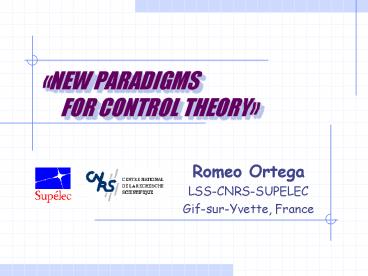- PowerPoint PPT Presentation
1 / 28
Title:
1
NEW PARADIGMS FOR CONTROL THEORY
- Romeo Ortega
- LSS-CNRS-SUPELEC
- Gif-sur-Yvette, France
2
Content
- Background
- Proposal
- Examples
3
Facts
- Modern (model-based) control theory is not
providing solutions to new practical control
problems - Prevailing trend in applications data-based
solutions - Neural networks, fuzzy controllers, etc
- They might work but we will not understand
why/when - New applications are truly multidomain
- There is some structure hidden in complex
systems - Revealed through physical laws
- Pattern of interconnection is more important than
detail
4
Why?
- Signal processing viewpoint is not adequate
- Input-Output-Reference-Disturbance.
- Classical assumptions not valid
- linear small nonlinearities
- interconnections with large impedances
- time-scale separations
- lumped effects
- Methods focus on stability (of a set of given
ODEs) - no consideration of the physical nature of the
model.
5
Proposal
- Reconcile modelling with, and incorporate energy
information into, control design. - How?
- Propose models that capture main physical
ingredients - energy, dissipation, interconnection
- Attain classical control objectives (stability,
performance) as by-products of - Energy-shaping, interconnection and damping
assignment. - Confront, via experimentation, the proposal with
current practice.
6
Prevailing paradigm
Signal procesing viewpoint
Models
7
Drawbacks!!!
Class of admissible systems TOO LARGE !!
- Conservativeness (min max designs)
- High gain (sliding modes, backstepping)
- Complexity
Practically useless
Intrinsic to signal-processing viewpoint
8
Proposed alternative
(Energy-based) Control by interconnection
9
Models
- PLANT
- H(x) energy function, x state,
- (v,i) conjugated port variables,
- Geometric (Dirac) structure capturing
energy exchange - Dissipation
- ENVIRONMENT
- Passive port
- Flexibility and dissipation effects
- Parasitic dynamics
Control objectives
Controller
- Focus on energy and dissipation
- Shape and exchange pattern
10
IDA-PBC of mechanical systems
- To stabilize some underactuated mechanical
devices it is necessary to modify the total
energy function. In open loop
Where qÎRn, pÎRn are the generalized position and
momenta, respectively, M(q)MT(q)gt0 is the
inertia matrix, and V(q) is the potential energy
- MODEL
Control uÎRm, and assume rank(G)m lt n Convenient
to decompose uues(q,p)udi(q,p)
11
- TARGET DYNAMICS
Desired (closed loop) energy function
where MdMdTgt0 and Vd(q)
with port controlled Hamiltonian dynamics
where
12
All assignable energy functions are
characterized by a PDE!!
The PDE is parameterized by two free
matrices (related to physics)
13
Examples
BALL AND BEAM
14
Ball and Beam
15
Ball and Beam
16
Vertical take-off and landing aircraft
17
Cart with inverted pendulum
18
Examples
(PASSIVE) WALKING
Model
- Plant double pendulum
- Environement
- elastic (stiff)
19
(Passive) walking
Control objetive
Shape energy
20
(Passive) walking
21
(Passive) walking
other mechatronic systems teleoperators,
robots in interaction (with environement)
22
Piezoelectric actuators
- control objective shape energy
23
Control through long cables
E.g., overvoltage in drives
- model
- control objective change interconnection to
suppress waves
24
(No Transcript)
25
(No Transcript)
26
(No Transcript)
27
Dual to teleoperators
Many examples in power electronics and power
systems
28
Thank you!!































